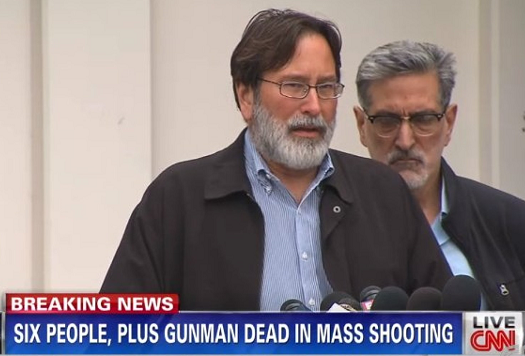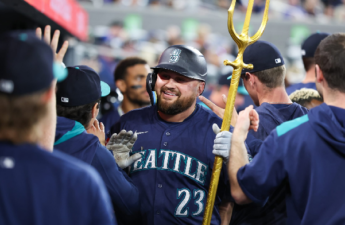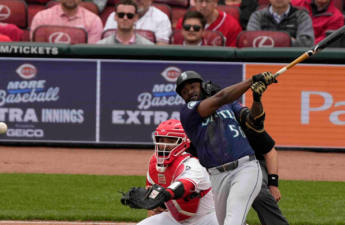
Every time there’s a mass-shooting or -killing in America, which is roughly constantly these days, there is a groundswell of effort to claim the event as political leverage for or against some particular cause that those behind it attribute to the source of the violence. This is a natural human reaction to tragedy and one that, unlike many people who observe this trend, I don’t dislike. People say that it’s about the guns or it’s about mental health or it’s about a lack of security or it’s about bullying or it’s about hopelessness or it’s about video games or, in the latest instance, it’s about misogyny.
All of these people are right, at least to an extent. There are tens of little causes that contribute to each one of these killing sprees that the United States churns out and it’s worth examining each one to try to see what could have been done to prevent any given incident. Tragedy is bad enough for people to experience, individually or collectively, but it is totally wasted if we fail to try to mine it for lessons about our past and future and ways we can change the shape of society to save lives and prevent similar future trauma. We are hard-wired to do this as an evolutionary species and we should embrace this reaction to tragedy as it prompts us to have hope in the midst of heartache.
Most of the time, however, we focus on entirely the wrong thing. The voices advocating conciliation after 9/11 were drowned out by those who said it was a lack of security that had caused the incident, not a policy that uniformly oppressed and incited people in foreign lands. And I think the entire emphasis on mental health in the wake of so many of these recent shootings is a bit naive, implying that somehow there is a regimen of mandated screenings we can pursue that will remove all potentially uncorked people from walking the streets ever again. The gun question is certainly relevant, but seems also to fall a bit short of the boat when it must be acknowledged that illegal guns are nearly as plentiful in this state as legal ones. And certainly arming the populous to replace mass-shootings with daily shoot-outs at the OK Mall seems a little short-sighted, especially in light of the recent sprees by police in my native Albuquerque and other cities that have embraced a culture of shooting first and obfuscating questions later.
The issue has always struck me as a little more fundamental than guns specifically, though I agree we certainly have a gun problem in this country. It’s about a culture and society that routinely honors and glorifies violence and, more damningly, specifically advocates violence as a solution to problems. Finland does not have a significant problem with mass-shootings, despite the fact that plenty of people are toting firearms up to Lappland to slaughter reindeer. Anders Breivik aside, this problem doesn’t seem to frequently plague the rest of Europe either. And despite their poverty and desperation, no developing nations not ensconced in civil war seem to be frequently beset by marauding young men taking arms against a sea of troubles and massacring their friends and neighbors.
America is not the only country that fights wars, has a military, or advocates killing for your country. I am often criticized for failing to see this, for failing to throw just as many proverbial stones at all the other nations who seek to subjugate the rest of the world with firearms and explosives as I do at my native land. However, the fact that America spends as much on its military as the next nine largest military spenders combined seems to indicate that we have a bit of a disproportionate issue. Nowhere else is violence so frequently lauded as the answer or is more energy, effort, money, and time expended to train people to use violence to solve the society’s perceived problems.
But more pivotally, violence is the only universal coherent explanation for what is wrong with all these mass-shootings. The biggest problem with the shootings is that they kill and injure people. That may seem like a really juvenile or mundane statement, but it is also transparently true and I think it’s a little profound. We can argue that if we had better mental health services or banned violent video games or washed racism or sexism out of our society that these incidents would be less likely. And maybe they would. But nothing would actually eliminate all of them other than getting rid of the urge and/or willingness to do violence. It is not the content of the message or frustration or even the precise means and weaponry that is problematic about killing sprees. It is the killing.
The fact that this is not the starting point of widespread discussions of this unending series of killings indicates just precisely how far down the rabbit hole of presumption of violence we really are. No one would question on a national talk show why Elliot Rodger would choose violence as his method of expression in this circumstance, because of course people take out their actions in the form of violence. No one turns the lens on how pervasive violence is in our societal values and our advocacy because it’s just a given that violence is necessary and honorable most of the time. People see these killings not as innate perversions of humanity by invoking violence, but merely a misuse of the tool of violence since everyone else who uses it is a “hero”.
I’m not trying to say that Elliot Rodger was a prime candidate for pacifism. I am more than familiar with the critique of my viewpoint as impractical in a world where wars are so common and the desire to damage the bodies of others is seen as innate to our nature. However, saying that these shootings are not, most fundamentally, about violence clearly seems to miss the point. Without violence, these would be uncomfortable screaming matches or maybe even fringey protests or blog posts, not tragedies that leave tens dead and hundreds more lives shattered in pain and loss. To defeat the rise of mass-killings and prevent them in the future, we really only have one option of what to try to limit, which is violence itself.
And since we can’t eliminate violence by imprisoning everyone and isolating them entirely from each other (or at least we probably shouldn’t), we have to try to convince people that violence is not the answer to their challenges. Which seems to start first and foremost at the top, with setting a new precedent for how the country is going to resolve differences with its rivals. And while I’m glad we didn’t invade Ukraine in the recent spring unrest, we still are a long long way from resolving our differences with others peacefully. And rarely is that more obvious than during Memorial Day, as especially augmented by the unending stream of enforced patriotism surrounding public events thereon, ranging from camouflage-style uniforms on the baseball diamond to jingoistic graveside speeches. Whatever you may think about some past wars in American history and those who fought them (I recognize that few of you are zealous pacifists like me), it is impossible to ignore that modern patriotism and militarism are manifest to convince vulnerable young men and women to kill in wars of convenience for economic imperialism. Even if you believe the “heroes of World War II” actually “died for your freedom”, that memory is being warped into an excuse for de facto drafting the poor and would-be noble of our nation into oppressive attacks on the innocent children of other countries.
Kind of like the oppressive attacks on the innocent children of our country.
I’m not saying, either, that if all displays of jingoistic militarism went away tomorrow that all the Elliot Rodgers of the world would too. But I think there’s a high correlation between the existence of both and that the causal links are strong and possibly measurable. (A future version of this post may try to track incidents like this on a graph.) I don’t think Rodger came up with the idea that violence was the best expression of his rage on his own. I think it was something he was taught, something inculcated in him by a number of influential and powerful sources from a young age, something we are raising people to believe in a society whose ode to bombs bursting in air begins each important event within it.
I also want to address the proximate cause du jour that so many are citing for the latest mass-shooting. It neither bears having its own post on the subject nor does it really dovetail perfectly with my above point, so I’m just awkwardly throwing up that dividing line and starting over on this subject. There’s been a lot of discussion of Facebook along the lines of this Guardian article, blaming the killings in Isla Vista on misogyny and the idea that he was entitled to female companionship.
While there’s no doubt that Rodger was a sexist, a misogynist, and a terrible human being, there’s something to be said for the idea that the article above and its ilk are a slight misinterpretation of the facts. I don’t think Rodger was upset because he was taught that he should be able to just have any woman who he wanted and that no one should ever reject him. Rather, I think he was frustrated with being a chronically lonely person in a society that promotes sex and sexuality, with being unable to connect with people when so many others around him were making so many connections, to feel like his college experience, when “everyone” is hooking up and getting it on, was punctuated by the worst time of his life, not the best.
This is in no way meant to justify or explain his actions. I have already done the explanation above that violence is the core issue. But I think that not enough is done in general in our society to examine how we treat the lonely and socially isolated. These people are not necessarily mentally ill, even if we set aside the fact that our culture slaps a “disorder” on top of anything that makes us uncomfortable or seems hard to explain or is different. And these people may have really unsavory aspects that prevent them from connecting with people, like being sexist or racist or jerks. But the hard part of this whole question is that there are honestly just some people who are lonely for things that are not fatal character flaws. They simply aren’t attractive, or are weird, or try too hard, or are socially inept. These sometimes fester over time and become larger problems that manifest in resentment and morph into sexism or being a jerk, but the characteristics themselves are often just unfortunate problems that don’t have an easy solution.
I’m not saying anyone is entitled to the company of their preferred gender of choice or to a relationship, per se. But doesn’t it seem like everyone should be able to experience companionship if they want to? Doesn’t it seem cosmically unfair if some people are just too hopelessly weird or awkward or unattractive to avoid eternal loneliness? And this does not obligate any one person or group to do anything about it… relationships are the most intensely personal, important, and choice-based thing in someone’s life – they are entirely up to the person and no one should be a martyr for someone else not being lonely. But what do we do with people who see a world that worships togetherness and romantic and sexual contact and can simply never have it on a meaningful level? This is not something that is easily washed away by saying they did something to deserve this loneliness. All too often, they didn’t. They just are on their own through no fault of their own.
Again, I stress that this is not Elliot Rodger’s story, almost certainly, but he’s enough like someone in this story that it’s worth discussing this conundrum. The person who provides the best example of this kind of phenomenon isn’t a person at all, but a fictional half-blood wizard, namely Severus Snape. Lauded as perhaps the most complicated, developed and intriguing character in the Harry Potter series, if not all millennial literature, Snape provides us with vast insight into what it means to be lonely and unable to do anything about it. And while his story is the more typical trope of unrequited love for one specific person, I see in Snape aspects of the modern lonely high school and college students who go without any connections and would be happy with a number of different possible people as long as they had someone to love, cherish, and connect with.
Snape is weird, vaguely unkempt, and deeply unattractive. And while his resentment of the bullying James Potter and the cool kids who get the girls leads him down a dark path toward revenge and elitism, Snape is not innately a sexist or a misogynist or a hater of any kind. He’s just a victim of losing the genetic lottery and being unable to make himself normal enough to fit in. His is the story of countless young people (disproportionately men, probably, because of the shape of our society, but not exclusively by any stretch) and their isolation is something we don’t like to talk about, think about, or even admit because of its deep unfairness. No one in America ever likes to admit defeat or the unfixability of anything, but the idea that some people are just doomed to loneliness by the nature of who they are and the choices that others will make about them is devastating. And while this conclusion may not be entirely true in an absolute sense, this country, like all countries, will continue to produce loners and outcasts.
Only by looking at these people head-on and trying to give them other things in life to be excited about and other ways to find connection and meaning can we have a hope of limiting the unfairness of their unfortunate circumstances. I won’t go so far as to say that this kind of active engagement will prevent mass-shootings, because we’ve discussed the only real way to do that, but it might just bring people off the ledge from believing that so little in their life matters that they can throw it away and, worse, use it as a platform for ending others.


